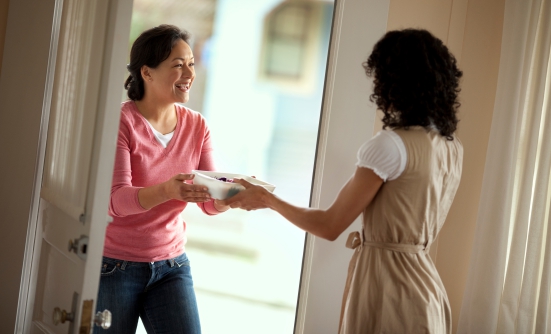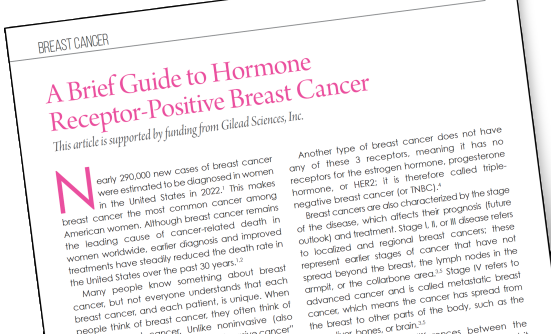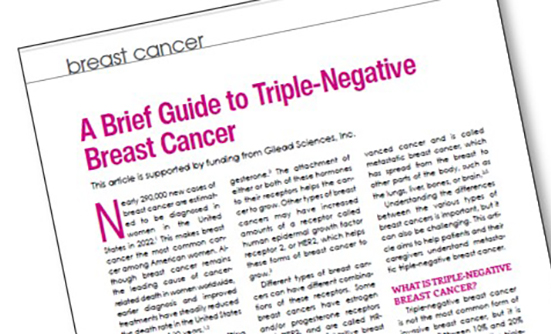Have you noticed that ever since your diagnosis, your friends, neighbors, and family members have been asking you “How can I help you? Just tell me and it will be done.”
And your reply is “Oh, we are doing okay. Thanks, though.”
They might even pursue it further, saying “No. I want to know how to help. Give me something to do for you and your family.”
And again, you respond, “I will let you know. Thanks.”
Well, now is the time to let them know! A cancer diagnosis means a lot of appointments for tests, consultations, and treatments, which leaves less time for everyday tasks. So now is the time to make a list of tasks that others can do that will really make life easier for you and your family.
You may hesitate though; you may feel like you are imposing by accepting help, even if it is offered. What you need to realize is that if the situation were reversed and your neighbor, friend, or family member was dealing with cancer, you would be saying the same thing to them—“How can I help?” So, step 1 is to accept the help that is offered to you.
Step 2 is to make a list of all the activities that take place on a daily, weekly, or monthly basis. Let’s start with food preparation.
Meal Planning
Your friends, neighbors, and family can be a big help when it comes to meal preparation, and more than likely they will be very happy to prepare and deliver healthy meals to your home. This action is an easy way for your friends to help and can be a huge stress relief for you and your family. Having a casserole from a friend requires no cooking—just knowing the right temperature at which to reheat it. To help with planning, you (or a friend) can keep a calendar to coordinate meal deliveries from your circle of friends.
There will still be items you need from the store. Consider asking if a family member or friend can take care of your grocery shopping—they can even shop online from your local grocery store and arrange for delivery to your home or contactless pickup outside the store.
Appointments
Keep a calendar of all your medical appointments and speak with your doctor or nurse to see if you will be able to take yourself or if someone should accompany you. For example, if you are receiving breast radiation for stage I breast cancer, you will be able to drive yourself back and forth without trouble. If you are receiving chemotherapy that triggers side effects within an hour or so of receiving the drugs, then someone needs to chauffeur you to the appointment and back home. Include this type of planning on your calendar.
Kids' Activities
If possible, it’s a good idea to keep your children’s lives as normal and routine as you can. If you have children or teens who are involved in after-school activities, you might arrange for a friend to drive them. Carpools are an excellent and easy way for friends to help ease stress on you and your family.
Your teens might be able to drive themselves, but it is still important for someone in the family or a family friend to attend their events (such as a sporting event), especially if they are used to having a parent watching from the bleachers. If you are at a point in your treatment (especially for chemotherapy) where your white blood counts might be running low, making you more susceptible to infection, it is best to stay home and have the family caregiver go watch the game.
Picking Up Prescriptions
Many of your prescriptions can be shipped directly to your home. In other cases, you may be able to have prescriptions filled while you are at the cancer center receiving treatment. However, there may be times when you will need to have prescriptions filled as soon as possible; say, in the event you need to address an unexpected side effect of your treatment. It is a good idea to have a friend “on call” to pick up the medicine from the pharmacy and bring it to your home. This is another easy task that a friend would be happy to do for you.
Household Chores
My advice on household chores is simple. Delegate. Delegate. Delegate. Have everyone in the family who lives under your roof pitch in and help. A youngster can clean up their room. Teens can do laundry. The family caregiver might coordinate meals and maintain the kitchen and bathrooms. If it’s in the budget, consider having a cleaning service come into the home. If a group of friends ask what they can do to help, a great suggestion is a gift certificate for a housecleaning service.
Surrounded By Support
Cancer care and care treatments are much easier to endure when we allow others to pitch in and help us. Remember, you will have the opportunity at some point to help those who are helping you now. When someone in your community has a crisis in their lives, guess who will be saying, “How can I help you?”
YOU!
Caregivers' Corner
Are you a primary caregiver to someone diagnosed with breast cancer? You might be a spouse, a parent, an adult child, or a friend of the person diagnosed. I’m sure this role was unexpected. And I’m sure you want to be a great support to your loved one. I’d like to give you a few words of advice. As the caregiver, it is very important to take care of yourself. I’m reminded of the flight attendant who gives the instructions before the plane takes off that “you must put your oxygen mask on before you help someone else with theirs.” Although a bit cliché, these are wise words. As the family caregiver, if you aren’t taking care of yourself emotionally and physically, then you will not be the effective caregiver that you want and need to be.
Pay attention to your own health needs. This means eating a healthy well-balanced diet and exercising. For example, if you went to the gym 5 days a week before your loved one’s diagnosis, you should continue to do so. You might have to go at a different time, but go!
Not a gym-goer? Another effective exercise option is a power walk for 30 minutes around your neighborhood, ideally with a friend or neighbor you enjoy spending time with.
Respite is also needed, meaning you need an occasional break. Get a facial or pedicure. Go swimming. Take a walk. Watch a movie. Call a friend. Remember, no one was meant to go on this journey alone. That includes the family caregiver.













